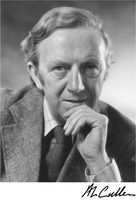Alexander Lamb Cullen facts for kids
Quick facts for kids
Alex Cullen
|
|
|---|---|
 |
|
| Born |
Alexander Lamb Cullen
30 April 1920 |
| Died | 27 December 2013 (aged 93) |
| Alma mater | Imperial College London |
| Awards | Royal Medal (1984) Clifford Paterson Lecture (1984) Faraday Medal (1984) |
| Scientific career | |
| Institutions | University College London |
| Thesis | Absolute power measurement at micro wave frequencies (1951) |
| Influences | Harold Barlow |
Alexander Lamb Cullen (30 April 1920 – 27 December 2013) was an important British electrical engineer. He was known for his work with microwaves and radio science.
About Alexander Cullen's Career
Alexander Cullen led the Department of Electronic and Electrical Engineering at University College London. He worked there from 1967 to 1980. During this time, he held a special position called the Pender Chair.
In 1988, he wrote a book called Modern Radio Science. He also wrote a book about another scientist, Harold Barlow.
Awards and Special Recognitions
Alexander Cullen received many important awards for his work. In 1977, he became a Fellow of the Royal Society (FRS). This is a very high honor for scientists in the UK.
In 1984, he received the Royal Medal. This award recognized his many great contributions to microwave engineering. This field deals with how microwaves work and how they are used. He was especially honored for his research on microwave antennae. These are special devices that send and receive microwave signals.
In the same year, he also won the Faraday Medal. This award came from the Institute of Electrical Engineers.
Also in 1984, he gave a special talk called the Clifford Paterson Lecture. He spoke to the Royal Society about "Microwaves: the art and the science."
In 1960, he was given the title of Order of the British Empire (OBE). This is an honor from the British King or Queen for important public service.
 | William M. Jackson |
 | Juan E. Gilbert |
 | Neil deGrasse Tyson |

